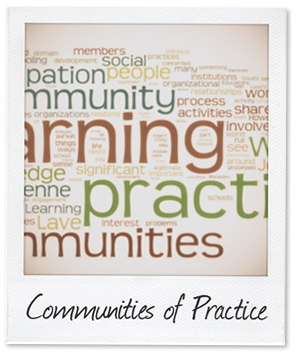-

How often have you come away from a staff meeting….a conference… a training course with fresh perspectives and practice possibilities gleaned from the conversations you have participated in over lunch and in the coffee breaks - the informal opportunities to meet other practitioners, to share concerns, to learn from what other people are doing in situations similar to your own.
In these social contexts you are able to connect with others with a shared focus, a common purpose and relevant practice. If such opportunities are regular, perhaps you establish and maintain a network of relationships on which you can draw for information or advice when you encounter new challenges in your work. It could be said that you are participating in a ‘community of practice’.
The term ‘community of practice’ is now widely used in relation to collaborative working, sharing experience, learning together and the development of practice. The use of the term may be recent, communities of practice, according to Etienne Wenger, are, however, age-old.
Etienne Wenger developed the theory of learning in communities of practice in his work with Jean Lave, studying how people learn to become professionals by working alongside colleagues in a practice context. According to Wenger, communities of practice are everywhere, they develop organically and we all participate in multiple communities of practice, not just at work but in other aspects of our life too as we connect with other people who share an interest, a purpose and common language. He suggests that in these situations our main aim is to feel that we belong in a group with which we identify. Learning is inherent but may not be an explicit aim of our participation.
‘Communities of practice are groups of people who share a concern or a passion for something they do and learn how to do it better as they interact regularly.’ (Wenger circa 2008)
